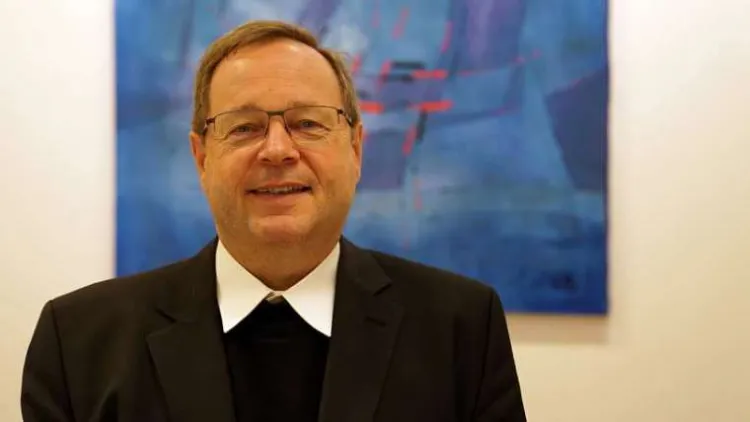Bishop Georg Bätzing of Limburg./ Bistum Limburg.
The chairman of the German Catholic bishops’ conference said Wednesday that a planned day of protest against the Vatican’s “no” to blessings for same-sex couples is not a “helpful sign.”
Bishop Georg Bätzing said in an April 28 statement on the bishops’ conference website that blessing services were “not suitable as an instrument for Church-political demonstrations or protest actions.”
CNA Deutsch, CNA’s German-language news partner, reported that the bishop was responding to an appeal to Catholics to take part in a nationwide event on May 10 in defiance of the Vatican ruling, which was issued in March with the approval of Pope Francis.
The event, organized by Catholic pastoral workers, is known as “Segnungsgottesdiensten für Liebende,” or “blessing services for lovers.” Organizers hope that same-sex couples across Germany will take part in the event.
The Congregation for the Doctrine of the Faith (CDF) published a “Responsum ad dubium” March 15 replying to the question, “does the Church have the power to give the blessing to unions of persons of the same sex?” The CDF answered, “Negative,” outlining its reasoning in an explanatory note and accompanying commentary.
The Vatican statement sparked protests in the German-speaking Catholic world. A number of bishops expressed support for blessings of same-sex couples, while churches displayed LGBT pride flags, and a group of more than 200 theology professors signed a statement criticizing the Vatican.
In his statement, Bätzing said: “After the permanent council of the German bishops’ conference exchanged views a few days ago, I would like to state emphatically: Of course, people with a homosexual orientation, including those who live in same-sex partnerships, have a place in the Church. They are welcome.”
“It is part of the pastoral ministry of the Church to do justice to all these people in the respective concrete situations on their path through life and to accompany them pastorally.”
“In this context, however, I do not consider public actions, such as those planned for May 10, to be a helpful sign and a way forward.”
“Blessing services have their own theological dignity and pastoral significance. They are not suitable as an instrument for church-political manifestations or protest actions.”
Bätzing, the 60-year-old bishop of Limburg, noted that in Germany and other parts of the worldwide Church discussions have taken place for years about Catholic teaching on sexual morality, including homosexuality.
He said that these discussions focused on how Church teaching “can be further developed with viable arguments — on the basis of fundamental truths of faith and morality, progressive theological reflection, and also in openness to newer results in the human sciences and the life situations of people today.”
He continued: “This includes an appropriate discussion of the question of blessing services.”
As chairman of the German bishops’ conference, Bätzing is a central figure in the “Synodal Way,” a process bringing together German lay people and bishops to discuss four major topics: the way power is exercised in the Church; sexual morality; the priesthood; and the role of women.
Bätzing, who has previously expressed support for blessings of same-sex couples, said that the “Synodal Way” was an appropriate forum for the debate about blessings.
“In the current situation, the Synodal Way is a central place to discuss the issue of successful relationships in a comprehensive way,” he said.
Source: CNA

